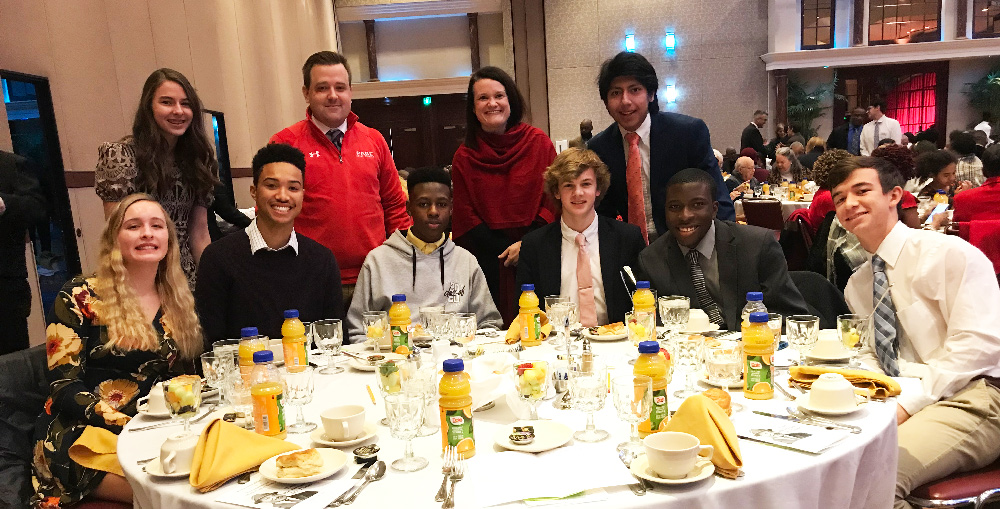
By Matt Logan, director of discipleship and young adult ministry
On Monday, Jan. 20, I had the opportunity to take eight Page High School students to the annual Dr. Martin Luther King Jr. Memorial Breakfast hosted by the Greensboro Human Relations Commission. We were joined by church member and state Rep. Ashton Clemmons.
As we enjoyed each other’s company over breakfast, I was struck by how comfortable I felt. As the presenters and speakers memorialized Dr. King and applause was heard from every table, I had a moment to reflect: Was my comfort indicative of a failure to remember rightly?

Matt Logan with Page High students and state Rep. Ashton Clemmons at the annual Dr. Martin Luther King Jr. Memorial Breakfast hosted by the Greensboro Human Relations Commission.
Don’t get me wrong, I was incredibly grateful to be there. Students who may not otherwise have gotten the chance were rubbing elbows with civic leaders from all over North Carolina. We all left feeling invigorated and ready to take on the challenge the keynote speaker had offered: “Be the Dream!” Additionally, the eggs and potatoes were great.
It was clear to me that the Dr. King being memorialized was the public King. This public King has wide appeal, inspires many, and is deplorable to very few. This King is certainly less controversial than many civil rights leaders today. But this King is not the real Rev. Dr. Martin Luther King Jr. The real King had an almost 80 percent disapproval rating during his lifetime, a rate of disapproval far higher than any president in the history of the United States. He was derided by conservatives and liberals, white folks and black folks, and from every corner of religious life in America. When one quoted King in 1967, it would have, at least momentarily, quieted almost every dinner table in every community in America.
I hope the church isn’t at risk of losing the memory of the real Dr. Martin Luther King Jr. It is probably inevitable for a figure as public as King for his legacy and influence to be shaped by the multitudes who remember him. I don’t think we mis-remember King as much as I think we fail to remember rightly. King was the man who inspired millions at the Lincoln Memorial when he delivered the famous “I Have a Dream” speech. He was also a thorough going Baptist minister, claimed by the church. The church was the foundation for King’s upbringing. Both his maternal and paternal grandfathers were Baptist ministers. King sang in the choir, frequented youth group and Sunday School, and once, when he was 12, even raised doubts about the bodily resurrection. The church shaped, inspired, and taught him.
King was not a nominal political actor among many diverse political sympathizers. King’s life and actions were shaped by his faith. He was begotten out of a rich tradition of activism among black churchmen. His father, Martin Sr., was one of the first clergymen to denounce the racial animosity against the Jews in the 1930s. King Jr. spoke out of this tradition and from this tradition. King didn’t think all people should be treated justly because it would be great if everyone could be nice to everyone else. He did so because he was convinced that “the arc of the moral universe bent towards justice.” He preached, advocated, and marched as a Christian prophet for his time, and still, for our time. As the church, if we do not have the obligation, we at least should have the courage to recapture the memory of King’s prophetic voice.
“For scoundrels are found among my people; they take over the goods of others. Like fowlers they set a trap; they catch human beings. Like a cage full of birds, their houses are full of treachery; therefore they have become great and rich, they have grown fat and sleek. They know no limits in deeds and wickedness; they do not judge with justice the cause of the orphan, to make it prosper, and they do not defend the rights of the needy.” (Jer. 5.26-28)
Prophets are rarely popular while they’re alive. They have hard jobs. They are tasked with telling the truth to people who don’t want or care to hear it. Impossibly, they are tasked with convincing those same people, who usually have tremendous amounts of power, to change their ways.
The prophet risks his or her reputation and standing in the community by being a voice set apart. Prophets are not fortune tellers. Prophets are not so much concerned with the categories of ‘present’ and ‘future’ as they are with the categories of ‘is’ and ‘ought.’ 20th century Jewish theologian Abraham Heschel (a friend of King’s) writes, “The striking surprise is that prophets of Israel were tolerated at all by their people. To the patriots, they seemed pernicious; to the pious multitude, blasphemous; to the men in authority, seditious.”
The reason the prophetic voice of King cannot be mis-remembered is the same reason the prophetic literature in the Bible must continue to be preached and taught. The most dangerous and serious thing both King and the prophets of Israel did was to hold up a mirror to their communities. This prophetic gaze convicts us by demanding there be no middle ground. King never stopped speaking the truth about justice in order to build coalitions of compromise. Justice is Justice. That which is not for the purveying of justice is a tool to be used against the marginalized, the least of those in our midst. The prophet’s words are difficult to hear.
This kind of uncompromising call for justice is not convenient. It forbids us from making excuses and calls into question our motives. However, it has the potential to inspire us. We hear a voice speaking out and it gives us the courage to do the same. It makes it less difficult to tell the truth and more able to live with the consequences of doing so.
I suspect my level of discomfort arose because I have often heard and often failed to lift my voice with the prophet’s. I was uncomfortable because I know the words that King wrote in the newspaper margins in a Birmingham jail. He wrote those words to the moderate white churchmen. He wrote those words to me:
I must confess that over the past few years I have been gravely disappointed with the white moderate. I have almost reached the regrettable conclusion that the Negro’s great stumbling block in his stride toward freedom is not the White Citizen’s Counciler or the Ku Klux Klanner, but the white moderate, who is more devoted to “order” than to justice; who prefers a negative peace which is the absence of tension to a positive peace which is the presence of justice; who constantly says: “I agree with you in the goal you seek, but I cannot agree with your methods of direct action;” who paternalistically believes he can set the timetable for another man’s freedom; who lives by a mythical concept of time and who constantly advises the Negro to wait for a “more convenient season.” Shallow understanding from people of good will is more frustrating than absolute misunderstanding from people of ill will. Lukewarm acceptance is much more bewildering than outright rejection.
It is not bad to be devoted to order, or to hope for the absence of tension. However, what the prophet will not allow is be devoted to those things over and against justice.
The public Dr. Martin Luther King Jr. lacks the same integrity of the very real King. King gives us a vision for justice that compels us all to look at the world, as part of the world, and quiver in discomfort. His potent conviction to non-violence, anti-war advocacy, and criticisms of an economic system that incentivizes profit over people leave all of us to look in the mirror. Remembering the Rev. Dr. Martin Luther King Jr. rightly is a crucial task for the church. It challenges us to recognize the prophetic voices among us and gives us the courage to follow the call of the prophet.
